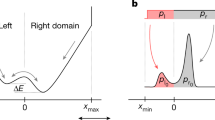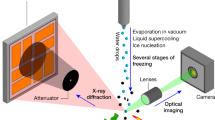Abstract
Pure water can only be vitrified by the very slow condensation of vapour on a metal surface maintained at very low temperatures1,2. Attempts to form vitreous ice by rapid cooling of liquid water invariably lead to formation of ice Ih (ref. 3). (Pryde and Jones4 did report a heat capacity change of rapidly cooled water at 126 K which they attributed to a glass transition, but could not reproduce this result in subsequent experiments.) Dilute aqueous solutions in contrast to concentrated aqueous solutions5 behave similarity to water and separate during freezing, even with the highest cooling rates available, into pure ice and concentrated solute6. We report here that macroscopic parts of samples of pure liquid water and of dilute aqueous solutions can be vitrified completely by jet-freezing of micrometre-sized aqueous droplets distributed in n -heptane as an emulsion—the resulting supercooling effect of ∼40 K being essential for vitrification7.
This is a preview of subscription content, access via your institution
Access options
Subscribe to this journal
Receive 51 print issues and online access
$199.00 per year
only $3.90 per issue
Buy this article
- Purchase on Springer Link
- Instant access to full article PDF
Prices may be subject to local taxes which are calculated during checkout
Similar content being viewed by others
References
Burton, E. F. & Oliver, W. F. Proc. R. Soc. A153, 166 (1935).
Venkatesh, C. G. & Rice, S. A. Science 186, 927–928 (1974).
Fletcher, N. H. Rep. Progr. Phys. 34, 913–994 (1971).
Pryde, J. A. & Jones, G. O. Nature 170, 685–688 (1952).
Angell, C. A. & Sare, E. J. J. chem. Phys. 49, 4713–4714 (1968); 52, 1058–1068 (1970).
Wolstenholme, G. E. W. & O'Conner, M. The Frozen Cell (Churchill, London 1970).
Rasmussen, D. H. & MacKenzie, A. P. J. chem. Phys. 59, 5003–5013 (1973).
McMillan, J. A. & Los, S. C. Nature 206, 806–807 (1965).
Rasmussen, D. & Luyet, B. Biodynamica 10, 319–331 (1969).
Luyet, B. & Rasmussen, D. Biodynamica 10, 167–191 (1968).
Dowell, L. G. & Rinfret, A. P. Nature 188, 1144–1148 (1960).
Olander, D. S. & Rice, S. A. Proc. natn. Acad. Sci. U.S.A. 69, 98–100 (1972).
Abragam, A. The Principles of Nuclear Magnetism, 126 (Clarendon, Oxford, 1973).
Moor, H. & Mühlethaler, J. J. Cell Biol. 17, 609–628 (1963).
Bachmann, L. & Schmitt, W. W. Proc. natn. Acad. Sci. U.S.A. 68, 2149–2152 (1971); in Freeze Etching, (eds Benedetti, E. L. & Favard, P.) 73–79 (Soc. Franc. Microsc. Electron, Paris 1973).
Jones, H. Rep. Progr. Phys. 36, 1425–1497 (1973).
Author information
Authors and Affiliations
Rights and permissions
About this article
Cite this article
Brüggeller, P., Mayer, E. Complete vitrification in pure liquid water and dilute aqueous solutions. Nature 288, 569–571 (1980). https://doi.org/10.1038/288569a0
Received:
Accepted:
Issue Date:
DOI: https://doi.org/10.1038/288569a0
This article is cited by
-
Molecular dynamics analysis of elastic properties and new phase formation during amorphous ices transformations
Scientific Reports (2022)
-
Pitfalls in Sample Preparation of Metalloproteins for Low-Temperature EPR: The Example of Alkaline Myoglobin
Applied Magnetic Resonance (2022)
-
A new technical approach for preparing frozen biological samples for electron microscopy
Plant Methods (2020)
-
Experimental tests for a liquid-liquid critical point in water
Science China Physics, Mechanics & Astronomy (2020)
-
A study of the hydrogen bonds effect on the water density and the liquid-liquid transition
Science China Physics, Mechanics & Astronomy (2019)
Comments
By submitting a comment you agree to abide by our Terms and Community Guidelines. If you find something abusive or that does not comply with our terms or guidelines please flag it as inappropriate.



